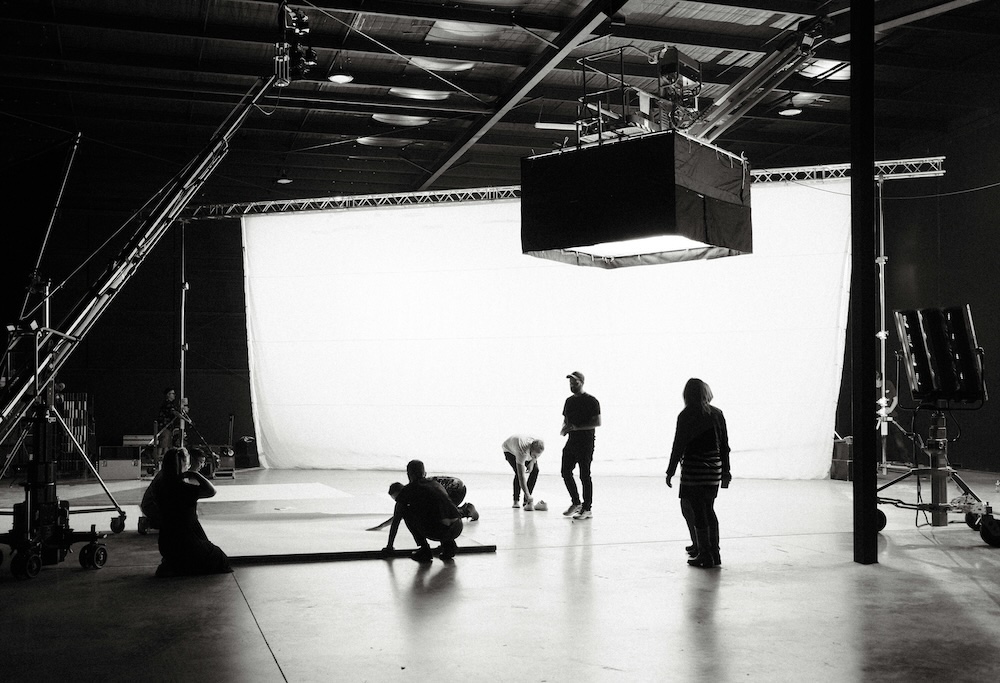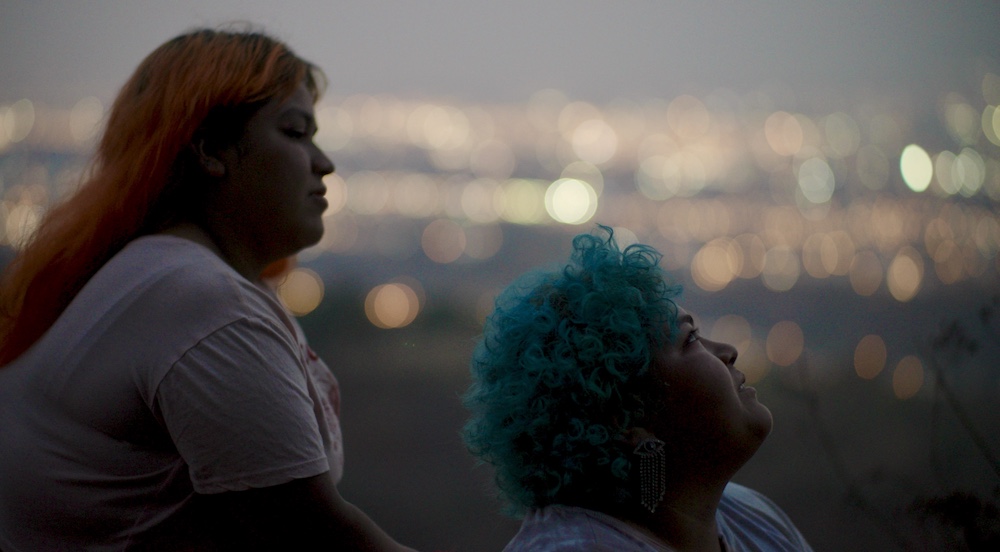
Warning Signs – Visionary filmmaker Joshua Oppenheimer on his new Movie
“All a poet can do today is warn.” These words were written by the English poet Wilfred Owen not long before he died on the battlefields of the Somme in 1918, but they feel deeply prescient to the moment we are living through.
With the signal from climate change getting louder and authoritarianism on the rise, artists occupy a unique position to draw attention to the perils of the path we are headed down. One artist who takes the responsibility to warn seriously is the visionary American filmmaker Joshua Oppenheimer, the director of the seminal documentary The Act of Killing.
Oppenheimer’s latest movie, The End, is showing at a special screening at Upstate Films this Sunday (February 23) in Rhinebeck followed by a Q&A with the director. The film tackles head-on the disastrous consequences of the climate crisis and, perhaps more importantly, the mindset that has allowed it to happen. Described by Oppenheimer as “a cautionary tale,” the post-apocalyptic musical stars Oscar-winner Tilda Swinton and follows the lives of a wealthy American family living alone in a bunker deep inside an abandoned salt mine 25 years after climate catastrophe has rendered the Earth’s surface unlivable.
“It appears to be about the future, but it’s really about the dysfunctions of the present, the destructive behavior that’s leading us collectively toward an abyss, and which is emptying our lives of meaning,” says Oppenheimer.

“Like any cautionary tale, we came together to make it because we’re hopeful that there’s still time for the audience to heed its warning, both in their own lives and as a human species.”
On the day we talk, Oppenheimer has brought his cautionary tale to Berlin, where he has just addressed an audience of activists at a climate march in the city ahead of an appearance that night alongside Swinton at the Berlin Film Festival.
He is tired from an early start from Copenhagen, where he has lived for some years now, but seems energized from the climate march appearance, which was his “first time speaking publicly at a protest like this” and was “a little terrifying,” he says.
Later that same night Swinton will make headlines for an acceptance speech at the festival in which she will draw attention to “the astonishing savagery” of “our greed-addicted governments who make nice with planet wreckers and war criminals.”
In The End the whiff of unresolved guilt hangs heavy around the family at the heart of the story. The father, portrayed with deep sensitivity by Michael Shannon, is a former oil industry exec evading culpability for the climate disaster he has helped unleash via the hagiography he is penning with the help of his infatuated son (George MacKay).
Swinton’s matriarch, meanwhile, hides her own survivor’s guilt by fixating nervously on the arrangement of her collection of 19th-century American landscape paintings. This perpetual state of neurotic self-delusion that the family exists within mirrors something Oppenheimer sees in contemporary Western society, particularly in his homeland.
“The film deals with the myriad ways we lie to ourselves,” he says. “Where we say, no matter how destructive and frightening the course we’re on, if we bury our heads in the sand and tell ourselves it’ll all work out for the best, somehow things will be fine. It’s not even false hope. It’s a kind of despair in the sheep’s clothing of hope.”

According to Oppenheimer, this desperate attempt to put on a brave face was in clear evidence at the recent inauguration of Donald Trump where the new president promised a new “golden age” for America while at the same turning his back on US climate commitments “that are essential if we’re to avoid the most catastrophic effects of climate change within our lifetimes.”
This strange gas-lighting of reality, where impending disaster is reframed as its exact opposite, is “a peculiar form of American despair and cynicism that pretends to be hopeful and optimistic,” he says.
At first glance, it is tempting to see The End as a morality tale in which the privileged elites are made to pay the price for their inertia and greed. But Oppenheimer had no interest in making “an eat-the-rich satire, where you get to feel somehow superior to them,” he says.
In his take, this binary division of people into good and evil, what he calls the “Star Wars morality,” is another ongoing self-deception that has caused great harm to Western society.
“It’s a lie that lives at the center of popular culture, and it’s one of our most destructive self-deceptions. Because when you attribute the cause of our problems to bad people who do bad things, you overlook the truth, which is that every act of evil committed in our history has been committed by a human being like you or me.”
To illustrate this, Oppenheimer points to a quote by the Italian Holocaust survivor Primo Levi, who once wrote: “Monsters exist, but they are too few in number to be truly dangerous. More dangerous are the common men, the functionaries ready to believe and to act without asking questions.”
This sensitivity to the true nature of evil is something that has characterized Oppenheimer’s work from the beginning. His Oscar-nominated first feature, The Act of Killing, is a hallucinatory journey inside the minds of the real-life perpetrators of a wave of anti-communist mass killings that took place in Indonesia in the mid-1960s.
Since many of those responsible for the mass killings were in government at the time he made the documentary, the killers who Oppenheimer interviewed had no qualms about admitting their guilt, often boasting openly of their crimes. It was, Oppenheimer said at the time, as if he had “wandered into Germany 40 years after the Holocaust only to find the Nazis still in power.”

- Photo by Pascal Buenning
The film, shot over six years, focuses mainly on the character of Anwar Congo, an executioner during the genocide. As part of the shoot, Congo and some of the other perpetrators agreed to take part in filmed re-enactments of their crimes. The result is at once kitsch and deeply disturbing.
But it is the story arc of Congo that pushes us to question our assumptions. The former killer undergoes a psychological unraveling in front of the camera, culminating in an unforgettable scene in which his body is convulsed by violent retching as he confronts the horror of his crimes.
Oppenheimer exposes us to the fragility and humanity of the killer, revealing how perpetrators are also trapped by their crimes. While this holds true for terrible crimes like murder, it also holds true for subtler forms of violence, he says. He points to the low-level bureaucrats enforcing immigration rules that keep vulnerable refugees trapped in limbo.
“Witnessing up close the way we treat people who have no enfranchisement within our democracy, people who are voiceless but have committed no crimes, it’s really to witness the banality of evil,” he says.
“You see people who go to work every day and hurt people as a career. And while the people they hurt might recover, the bureaucrats whose lives are hollowed out by implementing rules that are inherently cruel escape justice because they are the power structure. But they won’t escape punishment. Their lives are ruined.”
However, it is through compassion rather than condemnation that Oppenheimer sees a way out of these private despairs. Following a recent screening of The End, the theater director Peter Sellars drew Oppenheimer’s attention to a chapter in the Bhagavad Gita “where it talks about these monsters that are causing all this suffering on Earth and are essentially living in Hell.”
“The only way that the Earth can be healed is for the monsters to stop doing what they’re doing. And the only way that can happen is if they can feel such love and compassion from others that the need to change blossoms in their own hearts.”
At some point in The End, the family’s isolation is broken by the arrival of a stranger, played with beautiful poise by Moses Ingram. The family greets her character as both a threat and an opportunity. And while the impact of the encounter on Ingram’s character is ultimately ambiguous, her arrival forces the family to confront their own lies.
“The film exists on two scales, where “the end” is both the mortality of our species and our individual mortality. In both cases, how we live is just as important as prolonging our lives. Do we live with honesty? Do we try to change before it’s too late? And if it is too late, is it still worth addressing our exploitation of each other and of the biosphere? Because that’s the only meaningful way to live – through love and compassion, and not to squander this limited, beautiful and mysterious time we have together on this Earth.”
+ + +
Joshua Oppenheimer’s latest movie, The End, will be shown at a special screening at Upstate Films in Rhinebeck on Sunday, February 23, featuring a Q&A with the director
Write a Comment
You must be logged in to post a comment.







